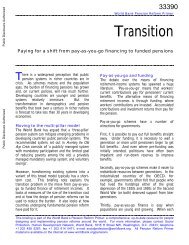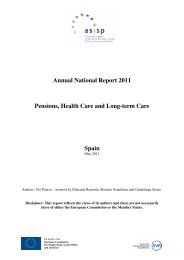Financial Sector Development in Africa: Opportunities ... - World Bank
Financial Sector Development in Africa: Opportunities ... - World Bank
Financial Sector Development in Africa: Opportunities ... - World Bank
You also want an ePaper? Increase the reach of your titles
YUMPU automatically turns print PDFs into web optimized ePapers that Google loves.
188 Dafe<br />
<strong>in</strong>stitutions of the <strong>in</strong>dustrialized economies. Policies of this “modernist”<br />
approach sought to transplant these <strong>in</strong>stitutions to the develop<strong>in</strong>g world<br />
(Honohan and Beck 2007, 7–12). 9 As a result, develop<strong>in</strong>g countries<br />
around the world started liberaliz<strong>in</strong>g and privatiz<strong>in</strong>g their f<strong>in</strong>ancial systems<br />
<strong>in</strong> the 1980s and 1990s.<br />
The evidence for the effectiveness of modernism has been mixed. By<br />
the end of the 1990s, countries <strong>in</strong> Sub-Saharan <strong>Africa</strong>, as <strong>in</strong> other regions,<br />
had made significant progress <strong>in</strong> macroeconomic stability and bank<br />
restructur<strong>in</strong>g, usually <strong>in</strong>clud<strong>in</strong>g the reentry of foreign capital and the<br />
privatization of banks (Beck, Fuchs, and Uy 2009, 14–15). Yet <strong>in</strong> many<br />
<strong>Africa</strong>n countries the <strong>in</strong>stitutional mechanisms needed to supervise and<br />
regulate bank<strong>in</strong>g <strong>in</strong> the modernist system were absent when reforms<br />
started. Thus, the first decade of f<strong>in</strong>ancial liberalization was accompanied<br />
by macroeconomic <strong>in</strong>stability, and liberalization often had devastat<strong>in</strong>g<br />
effects on the real economy, as evident <strong>in</strong> the grow<strong>in</strong>g dis<strong>in</strong>termediation<br />
<strong>in</strong> the 1980s and early 1990s. 10<br />
The success of the modernist approach <strong>in</strong> build<strong>in</strong>g <strong>in</strong>clusive f<strong>in</strong>ancial<br />
systems has fallen short of expectations. By the end of the 1990s, access<br />
to f<strong>in</strong>ance <strong>in</strong> Sub-Saharan <strong>Africa</strong> was still limited for those groups that<br />
had been traditionally shut out of the market, such as lower-<strong>in</strong>come<br />
households or SMEs. The operations of the newly licensed domestic and<br />
foreign commercial banks have concentrated on government lend<strong>in</strong>g<br />
and <strong>in</strong>ternational assets, avoid<strong>in</strong>g lend<strong>in</strong>g to the domestic private sector<br />
and <strong>in</strong> particular to agriculture (Chang 2009, 494–97; Honohan and Beck<br />
2007, 29–34). The experience has been similar <strong>in</strong> other world regions<br />
(Hanson 2003). In response to the overall disappo<strong>in</strong>t<strong>in</strong>g record of both<br />
market-replac<strong>in</strong>g activist and modernist approaches, the debate has<br />
shifted aga<strong>in</strong>, back toward more government <strong>in</strong>volvement but this time<br />
emphasiz<strong>in</strong>g the need for pro-market orientation (De la Torre, Gozzi, and<br />
Schmukler 2007; <strong>World</strong> <strong>Bank</strong> 2007, 145–46).<br />
Pro-market activism. Over the past decade a consensus has emerged<br />
that the role of government needs to go beyond ensur<strong>in</strong>g macroeconomic<br />
stability, toward build<strong>in</strong>g the necessary <strong>in</strong>stitutions for an <strong>in</strong>clusive,<br />
efficient, and stable f<strong>in</strong>ancial system, <strong>in</strong> a form of activity termed<br />
pro-market activism. 11 This view is <strong>in</strong>formed by a more recent body of<br />
literature that provides strong empirical evidence for the key role of<br />
<strong>in</strong>stitutions for economic development and the removal of market failures<br />
(Acemoglu, Johnson, and Rob<strong>in</strong>son 2001; Rodrik, Subramanian,<br />
and Trebbi 2004).







